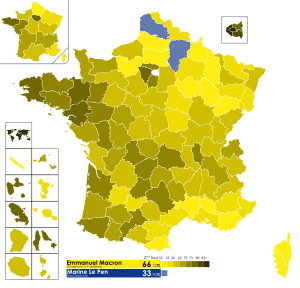| |||||||||||||||||
| Opinion polls | |||||||||||||||||
| Turnout | 77.77% (first round) 74.56% (second round) | ||||||||||||||||
|---|---|---|---|---|---|---|---|---|---|---|---|---|---|---|---|---|---|
| |||||||||||||||||
| |||||||||||||||||
Presidential elections were held in France on 23 April and 7 May 2017. Incumbent president François Hollande of the Socialist Party (PS) was eligible to run for a second term, but declared on 1 December 2016 that he would not seek reelection in light of low approval ratings, making him the first incumbent head of state of the Fifth Republic not to seek reelection. As no candidate won a majority in the first round, a runoff was held between the top two candidates, Emmanuel Macron of En Marche! (EM) and Marine Le Pen of the National Front (FN), which Macron won with a difference of more than 30% of the vote.
François Fillon of The Republicans (LR)—after winning the party's first open primary—and Le Pen of the National Front led first-round opinion polls in November 2016 and mid-January 2017. Polls tightened considerably by late January; after the publication of revelations that Fillon employed family members in possibly fictitious jobs in a series of politico-financial affairs that came to be colloquially known as "Penelopegate", Macron overtook Fillon to place consistently second in first-round polling. At the same time, Benoît Hamon won the Socialist primary, entering fourth place in the polls. After strong debate performances, Jean-Luc Mélenchon of La France Insoumise (FI) rose significantly in polls in late March, overtaking Hamon to place just below Fillon.
The first round was held under a state of emergency that was declared following the November 2015 Paris attacks.[1] Following the result of the first round, Macron and Le Pen continued to the 7 May runoff.[2] It was the first time since 2002 that a National Front candidate continued to the second round and the first time in the history of the Fifth Republic that the runoff did not include a nominee of the traditional left or right parties;[3] their combined share of the vote from eligible voters, at approximately 26%, was also a historic low.[4]
Estimations of the result of the second round on 7 May indicated that Macron had been elected by a decisive margin; Le Pen immediately conceded defeat.[5] After the Interior Ministry published preliminary results, the official result of the second round was proclaimed by the Constitutional Council on 10 May. Overall, 43.6% of the registered electorate voted for Macron; in 2002, by contrast, two-thirds of eligible voters voted against then-FN candidate Jean-Marie Le Pen.[6] When Macron took office on 14 May, he became the youngest holder of the presidency in French history and the youngest French head of state since Napoleon. He named Édouard Philippe as Prime Minister the next day. The initial government was assembled on 17 May; legislative elections on 11 and 18 June gave En Marche! a substantial majority.
- ^ "La France aux urnes pour le premier tour de la présidentielle 2017". Le Monde. 23 April 2017. Archived from the original on 7 July 2022. Retrieved 28 April 2017.
- ^ Cite error: The named reference
live-20170423was invoked but never defined (see the help page). - ^ "Macron et Le Pen au second tour d'une présidentielle hors norme". Sud-Ouest. Agence France-Presse. 23 April 2017. Archived from the original on 24 April 2017. Retrieved 23 April 2017.
- ^ Maxime Vaudano (23 April 2017). "Présidentielle 2017 : un revers inédit dans la Ve République pour les deux grands partis français". Le Monde. Archived from the original on 6 July 2022. Retrieved 23 April 2017.
- ^ Cite error: The named reference
live-20170507was invoked but never defined (see the help page). - ^ Maxime Vaudano; Adrien Sénécat; Eléa Pommiers (7 May 2017). "Le second tour de la présidentielle 2017 en 8 chiffres". Le Monde. Archived from the original on 19 December 2018. Retrieved 18 December 2018.



